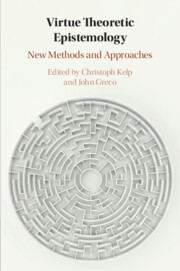Book contents
- Virtue Theoretic Epistemology
- Virtue Theoretic Epistemology
- Copyright page
- Contents
- Figures
- Contributors
- Acknowledgements
- Introduction
- Chapter 1 Closed-Mindedness As an Intellectual Vice
- Chapter 2 Epistemic Virtues and Virtues with Epistemic Content
- Chapter 3 Difficulty and Knowledge
- Chapter 4 What Is Epistemic Entitlement?
- Chapter 5 Knowledge-Producing Abilities
- Chapter 6 Virtue Epistemology, Two Kinds of Internalism, and the Intelligibility Problem
- Chapter 7 Knowledge Is Extrinsically Apt Belief
- Chapter 8 Explaining Knowledge
- Chapter 9 Anti-risk Virtue Epistemology
- Chapter 10 Responsibilism within Reason
- Index
- References
Chapter 8 - Explaining Knowledge
Published online by Cambridge University Press: 16 July 2020
- Virtue Theoretic Epistemology
- Virtue Theoretic Epistemology
- Copyright page
- Contents
- Figures
- Contributors
- Acknowledgements
- Introduction
- Chapter 1 Closed-Mindedness As an Intellectual Vice
- Chapter 2 Epistemic Virtues and Virtues with Epistemic Content
- Chapter 3 Difficulty and Knowledge
- Chapter 4 What Is Epistemic Entitlement?
- Chapter 5 Knowledge-Producing Abilities
- Chapter 6 Virtue Epistemology, Two Kinds of Internalism, and the Intelligibility Problem
- Chapter 7 Knowledge Is Extrinsically Apt Belief
- Chapter 8 Explaining Knowledge
- Chapter 9 Anti-risk Virtue Epistemology
- Chapter 10 Responsibilism within Reason
- Index
- References
Summary
It is suggested that instead of seeking to provide a reductive account of knowledge in general and treating particular kinds of knowledge, e.g., perceptual knowledge, in its light we should aim to shed light on knowledge in general by providing substantive accounts of the diverse ways in which subjects can be in cognitive contact with facts. Two cases are laid out: (i) a case of acquiring perceptual knowledge by exercising an ability to recognize things to be of a certain kind from the way they look; (ii) a case of acquiring knowledge from a perceived indicator (sign). It is claimed that the latter is a hybrid of perceptual and evidence-based knowledge. It is evidence-based because the knowledge is based on evidence provided by the indicator. It is perceptual because perceptual recognition is in play both in recognizing the indictor to be of a certain sort and in recognizing its indicative significance. Aspects of the metaphysics of recognitional abilities are outlined. It is argued that how a subject’s knowledge is acquired can be relevant to explaining why the knowledge counts as knowledge. The relation between knowledge and justified belief is addressed within a knowledge-first perspective.
Keywords
- Type
- Chapter
- Information
- Virtue Theoretic EpistemologyNew Methods and Approaches, pp. 181 - 202Publisher: Cambridge University PressPrint publication year: 2020

